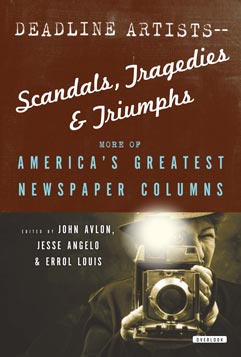In nature, there are certain movements so swift and so graceful that no mortal can adequately describe what has taken place. In the upper branches of a fir tree, a squirrel goes bounding from level to level, his eyes focused on the horizon, his heart pounding gently with the vibrations of the earth itself. Beyond a copse of birches, a doe stirs. Somewhere inside her she knows that a hunter is waiting, hip-deep in the snow. Swiftly, she turns and goes leaping through the drifts.
No man living is skillful enough to describe exactly how Roberto Clemente moved through the meadows of our land for 18 summers. His was a special style and grace. It was a smooth motion, fluid and compact. Most of the people who bought tickets to watch him play right field for the Pittsburgh Pirates never seemed to appreciate what he could do. They accepted it. But they never appreciated it. Pay $3.50 and see Roberto do the impossible. He was brilliant, to use a phrase that doesn’t really do justice to his memory.
No athlete of Clemente’s quality has been taken for granted quite so shamelessly. The customers applauded him like human beings who had seen too much television. Magic was dead. The super-sensational was too ordinary. Perfection was their birthright. They paid their money and they sat there as baseballs went sailing off toward a glove that never made a mistake. It was far too easy, far too sweet. Roberto just couldn’t make the game of baseball look hard enough.
Hit the ball to right at Pittsburg and forget it. Try to run to second on that slim figure in the outfield and you could count on the ball being there ahead of you. It was so lovely, so automatic that God Himself must have designed the play. Offensively, Clemente was one of the best of his generation. He rated right there with Mickey Mantle, Stan Musial, Willie Mays, Henry Aaron, etc. He was a walking immortal. He ran. He threw. He hit.
Trouble was that Roberto Clemente could never communicate with his true self. It was his opinion that newspapermen had a stringent pecking order. They regarded baseball players in the following way: On top were the American whites, followed rapidly by the American blacks. Next were the Latin whites. Way down at the bottom were the Latin blacks. They were nobody’s children.
“I feel that I would be considered to be a much better athlete if I were not a Latin black,” he told a newspaperman one sorrowful evening in Pittsburg two years ago when the Pirates were winning the World Series.
“I play as good as anybody. Maybe I play as good as anybody who plays the game. But I am not loved. I don’t need to be loved. I just wish that it would happen. There are many people like me who would like that to happen. I wish it for them. Do you know what I mean?”
Trouble was that few people truly understood what he was talking about. Even his colleagues on the Pittsburg Pirates admitted that they weren’t sure how to take him. They didn’t know if he was a self-serving egotist or a humanitarian who honestly loved his neighbors. Always Roberto Clemente seemed to be tiptoeing along a chalk line.
“This was the most decent man I’ve ever known,” said pitcher Steve Blass. “And nobody ever seemed to understand him. Maybe there was a language barrier, I don’t know. He was absolutely selfless. He’d talk about his physical problems and writers would make jokes. What he was trying to say was that Latins and blacks play hurt just like everybody else. They didn’t get that. They said he was a hypochondriac.”
When the Pirates got into the World Series, Clemente got a dozen hits. He was splendid beyond belief. After each game he would talk seriously to writers. Certainly he wanted credit for himself. Why? Not for personal glory, but because he wanted a forum for his beliefs. He had this wild notion about a sports city in his native Puerto Rico where indigent children could live. They could grow to manhood wit the high ideals of competitive athletes to guide them. Their whole lives would be changed by the opportunity to play games, to get a decent meal, to wear clean clothes.
“This is my dream,” he said. “I do not know exactly what this sports city will be like, but it will be beautiful. It will be open to everybody. No matter what they are. After I open the first one in Puerto Rico I will open others. I will do this thing because that is what God meant me to do. Baseball is just something that will give me a chance to do this.”
And Roberto Clemente believed he had this mission to perform for mankind. When the Governor of Puerto Rico asked him to head the island’s relief fund for the Managua earthquake victims, he threw himself into the project with a passion.
Here was one of the finest baseball players who ever lived and he went from door to door in the richer sections of San Juan, asking for donations. He raised $150,000 in cash and thousands extra in material goods. Roberto filled up the Santurce ball park with clothing and food. Clemente said he would personally take them to Nicaragua. He meant it.
The time came to transport those items. The airplane rose slowly from the runway, headed out to sea, made a desperate turn, and fell into the water. Thus died a humanitarian. Thus died a real man. Thus died a very fine baseball player. Not necessarily in that order.





